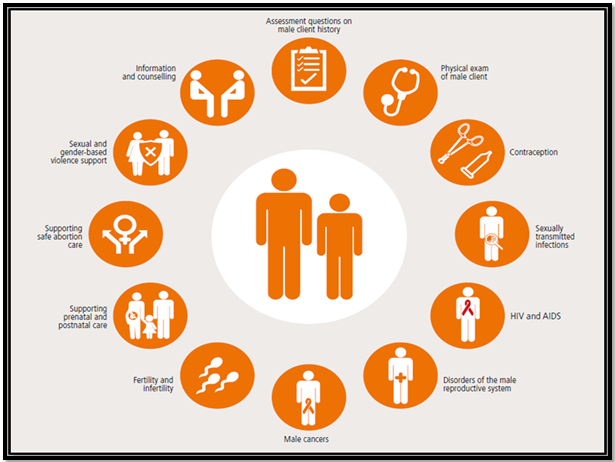BREAKING THE TABOO AROUND MEN’S REPRODUCTIVE HEALTH
Syllabus:
- GS 2: Issues Relating to Development and Management of Social Sector/Services relating to Health, Education, Human Resources (This topic is relevant for issues related to health and social sector services. It highlights the impact of societal stigmas on health outcomes).
- Essay Paper: The discussion on male reproductive health can be a potential essay topic, requiring an understanding of health, societal issues, and gender perspectives.
source:genderchemicals
Focus:
Discussing the importance of addressing men’s reproductive health and the societal stigma surrounding male infertility
Why in the News?
World Population Day (July 11) has recently passed, spotlighting various global population dynamics. This year, a critical but often overlooked issue in reproductive health has been highlighted: male infertility.
Introduction:
Male infertility remains a stigmatised issue, often shrouded in silence and misconceptions. This neglect exacerbates the emotional and psychological toll on those affected and hinders progress towards effective solutions. Addressing male infertility is crucial for comprehensive reproductive health discourse.
Understanding the Subject:
- Male infertility: It is not a standard experience and manifests in various forms, including low sperm count, poor sperm motility, or complete absence of sperm.
- Causes:
- They are multifactorial, involving stress, hormonal imbalances, genetic, anatomical, and epigenetic factors.
- Environmental pollution, indiscriminate use of pesticides on crops, and lifestyle factors such as diet, sleep patterns, work schedules, and substance abuse also significantly impact male fertility.
- External factors like pollution and pesticides can affect fertility and influence the epigenetic makeup.
- Diet, sleep patterns, work schedules, and consumption of alcohol and tobacco play major roles. The trend of late marriages poses additional challenges due to declining sperm quality with age.
Current Scenario and Challenges:
- According to the World Health Organization (WHO) in 2004, 60 to 80 million couples globally struggle with infertility.
- The Indian Council of Medical Research (ICMR) estimates that approximately 13 to 19 million Indian couples may face infertility issues.
- Male infertility accounts for 50% of these cases. This prevalence is expected to rise, driven by environmental and lifestyle factors.
Important Facts:
|
Strategic Interventions:
Despite the daunting statistics, male reproductive health can be safeguarded through various interventions:
- Awareness and Education: It is crucial to educate boys and young men about reproductive and sexual health from an early age. Parents, especially fathers, should engage in discussions about healthy practices.
- Healthy Lifestyle Choices: Adopting healthy eating, regular sleep patterns, and avoiding alcohol, tobacco, and other intoxicants can significantly improve reproductive health. Reducing exposure to occupational hazards, managing stress, and incorporating regular exercise, yoga, and meditation are also beneficial.
- Technology and Stress Management: Minimising excessive use of mobile phones and laptops, which pose potential risks due to their proximity to the body, is recommended.
Treatment Options:
- Routine Semen Analysis: Regular semen analysis after two to seven days of sexual abstinence, as recommended by WHO, can help diagnose issues.
- Surgical Interventions: Physical anomalies such as blocked sperm flow or undescended testicles can often be corrected surgically.
- Assisted Reproductive Technologies (ART): Techniques like intrauterine insemination (IUI), in vitro fertilisation (IVF), and intracytoplasmic sperm injection (ICSI) are viable options for couples facing infertility issues. Donor sperm insemination and adoption are alternatives for severe cases.
- Genetic Counselling: For male infertility due to genetic mutations, seeking genetic counselling and support from assisted reproductive technologies is critical.
Conclusion:
With millions of couples in India facing infertility issues, open and informed discussions on reproductive health are necessary. Breaking the taboo surrounding male infertility through awareness building, sex education, and timely medical interventions can support couples in their journey to parenthood. Addressing male infertility is not just a medical necessity but a societal imperative to help many realise their dream of having children.
Mains Practice Question:
Discuss the societal and health implications of male infertility. Evaluate the steps that can be taken to address this issue comprehensively.
Source:The Hindu




